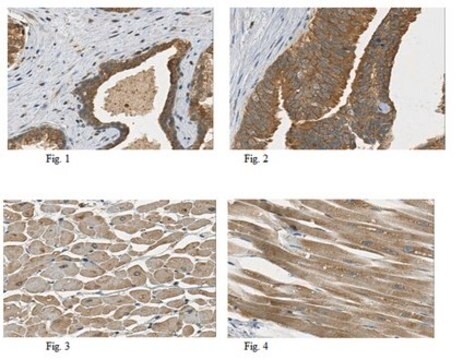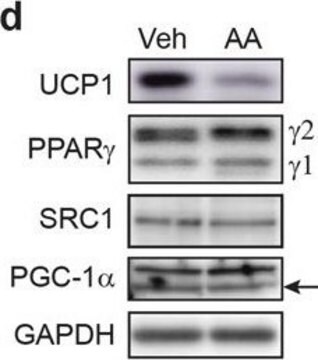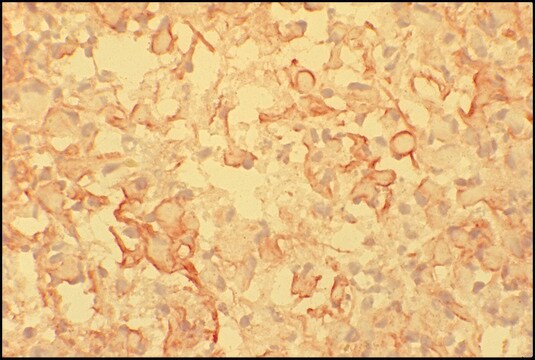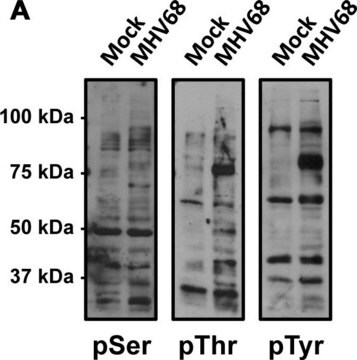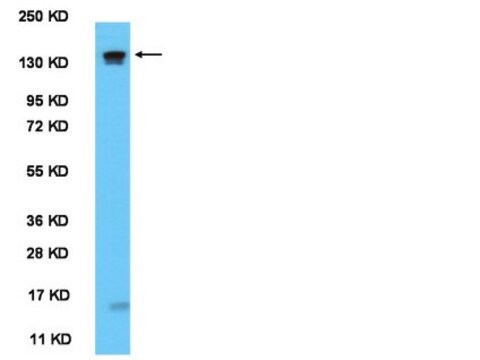AB2203
Anti-CLOCK Antibody
serum, Chemicon®
Iniciar sesiónpara Ver la Fijación de precios por contrato y de la organización
About This Item
Código UNSPSC:
12352203
eCl@ss:
32160702
NACRES:
NA.41
Productos recomendados
origen biológico
rabbit
Nivel de calidad
forma del anticuerpo
serum
tipo de anticuerpo
primary antibodies
clon
polyclonal
reactividad de especies
mouse, human, rat
fabricante / nombre comercial
Chemicon®
técnicas
western blot: suitable
Nº de acceso GenBank
Condiciones de envío
wet ice
modificación del objetivo postraduccional
unmodified
Información sobre el gen
mouse ... Clock(12753)
Descripción general
Circadian Locomotor Output Cycles Kaput, or Clock is a gene which encodes proteins regulating circadian rhythm. This gene encodes a protein that belongs to the basic helix-loop-helix (bHLH) family of transcription factors. Polymorphisms within the encoded protein have been associated with circadian rhythm sleep disorders. A similar protein in mice is a circadian regulator that acts as a transcription factor and forms a heterodimer with aryl hydrocarbon receptor nuclear translocator-like protein to activate transcription of mouse period 1.
Especificidad
Cat. # AB2203 recognizes CLOCK protein
Reactivity with other species has not been tested.
Aplicación
Anti-CLOCK Antibody is an antibody against CLOCK for use in WB.
Western Blot Analysis:
L6 lysate was resolved by electrophoresis, transferred to PVDF membrane and probed with anti-CLOCK (1:500 dilution of this lot).
Proteins were visualized using a Donkey anti-rabbit secondary antibody conjugated to HRP and a chemiluminescence detection system.
L6 lysate was resolved by electrophoresis, transferred to PVDF membrane and probed with anti-CLOCK (1:500 dilution of this lot).
Proteins were visualized using a Donkey anti-rabbit secondary antibody conjugated to HRP and a chemiluminescence detection system.
Calidad
Routinely evaluated by western blot on L6 tissue lysate.
Descripción de destino
Approx. 95 kDa
Nota de análisis
Control
L6 Cell Lysate.
L6 Cell Lysate.
Otras notas
Concentration: Please refer to the Certificate of Analysis for the lot-specific concentration.
Información legal
CHEMICON is a registered trademark of Merck KGaA, Darmstadt, Germany
GenBank is a registered trademark of United States Department of Health and Human Services
¿No encuentra el producto adecuado?
Pruebe nuestro Herramienta de selección de productos.
Código de clase de almacenamiento
10 - Combustible liquids
Clase de riesgo para el agua (WGK)
WGK 1
Certificados de análisis (COA)
Busque Certificados de análisis (COA) introduciendo el número de lote del producto. Los números de lote se encuentran en la etiqueta del producto después de las palabras «Lot» o «Batch»
¿Ya tiene este producto?
Encuentre la documentación para los productos que ha comprado recientemente en la Biblioteca de documentos.
Antibodies for assessing circadian clock proteins in the rodent suprachiasmatic nucleus.
LeSauter, J; Lambert, CM; Robotham, MR; Model, Z; Silver, R; Weaver, DR
Testing null
Xiaoqin Liu et al.
PloS one, 7(11), e50602-e50602 (2012-11-29)
Circadian rhythms in metabolism, physiology, and behavior originate from cell-autonomous circadian clocks located in many organs and structures throughout the body and that share a common molecular mechanism based on the clock genes and their protein products. In the mammalian
Yohei Kobayashi et al.
Neuron, 86(1), 264-275 (2015-03-25)
Circadian rhythms control a variety of physiological processes, but whether they may also time brain development remains largely unknown. Here, we show that circadian clock genes control the onset of critical period plasticity in the neocortex. Within visual cortex of
Nuestro equipo de científicos tiene experiencia en todas las áreas de investigación: Ciencias de la vida, Ciencia de los materiales, Síntesis química, Cromatografía, Analítica y muchas otras.
Póngase en contacto con el Servicio técnico
